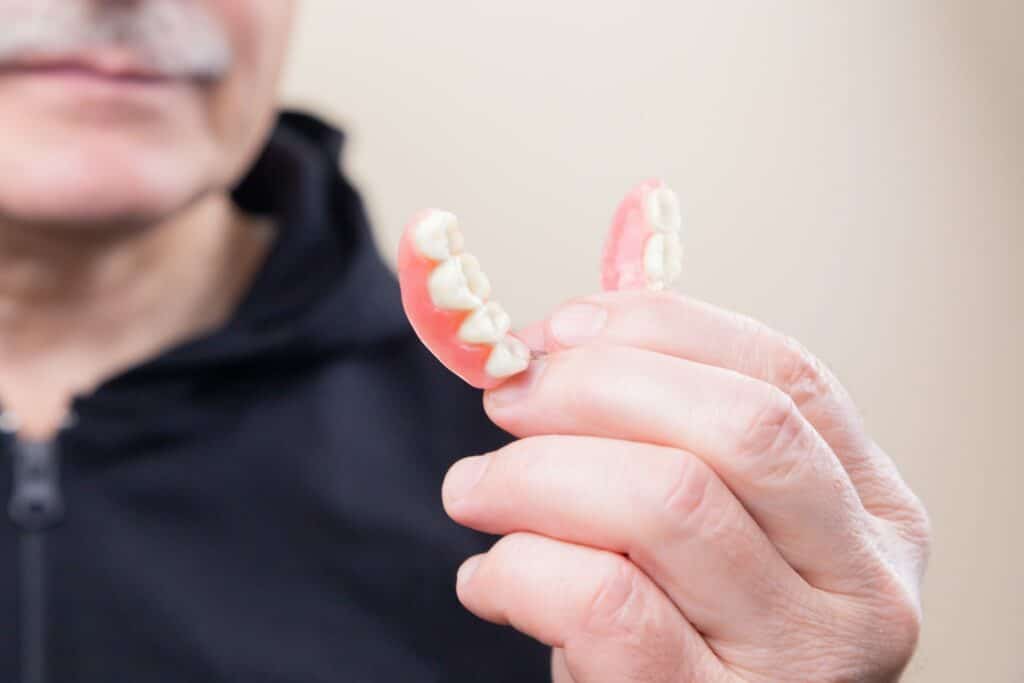Thanks to dental care provided to our generation by our parents and the beginning of the use of fluoride, very few people in my generation wear dentures. Due to lack of competent dental care, many family members in my parent’s generation wore dentures. I remember a lot of my relatives who had dentures only wore them to eat and if they were going out. Dentures today are much better fitted; however, we still see plenty of patients who do not wear their dentures to the drugstore.
Dental implants might be a good option for some of our patients who have the financial means. According to the National Institute of Health, dental implants have been on the rise since 1999. The number of dental implant procedures performed in the U.S. increased from 0.7 percent in 1999 to 5.7 percent in 2016. Of those who underwent the procedure, nearly 13 percent were between the ages of 65 and 74. A success rate of 98% has been reported for this procedure.
Dr Rod frequently refers to root canals, crowns and bridges a “pretreatment for implants!” He’s right as the total number of dental implants is expected to increase by 23% from 2020 to 2026. (https://www.trendstatistics.com/health/dental-implants-facts-statistics/)
Table of Contents
CARING FOR DENTURES
We will discuss what happens when things don’t go as planned, and our denture wearing patients come to us for advice. Nearly 69% of adults between 35-44 years old have lost >1 permanent teeth. 26% of adults that are 75 years old and older are missing all of them. In 2020, 41 million people were denture wearers.
Daily care tips for denture wearers:
- Don’t let dentures dry out
- Place them in a denture cleanser soaking solution or in plain water when you’re not wearing them.
- Never use hot water, which can cause dentures to warp.
- Most dentures today, including the teeth and pink denture base, are made with plastic(acrylic).
- The teeth of a denture are typically made from various types of resin or porcelain. Very few are still made with porcelain teeth today.
- Be careful with your beloved pet, dogs love to get a hold of dentures!
- Many dentures are broken by dropping them in the sink.
- Dropping a porcelain denture might result in breakage.
- Brushing the dentures – brushing dentures daily will remove food and dental plaque and help prevent them from becoming stained.
- Always brush dentures over a folded washcloth.
- If the dentures slip out of the wearer’s hand, a washcloth might prevent breakage.
- Patients can use special creams for dentures or any toothpaste.
- Some sources recommend dishwashing liquid (Dawn works great) or hand soap to clean dentures.
- Always brush dentures over a folded washcloth.
- Place them in a denture cleanser soaking solution or in plain water when you’re not wearing them.
What NOT to do:
- Do not use any household abrasives.
- A regular or denture brush works fine, but patients should not rely solely on denture cleansers.
- Some dentures have a permanent soft liner and this material requires special care. A patient should not use conventional brushing methods for these.
- They are given a special solution to clean them with at the time they were given their denture.
- Take care of your mouth – brush your gums, tongue, and palate every morning with a soft-bristled brush before you insert dentures.
- This stimulates circulation in your tissues and helps remove plaque.
- Patients should NEVER super glue their dentures!
- Most of the time dentists are professionally unable to repair them after they have been glued.
Fungal Infection
Up to half of those wearing dentures will develop a fungal infection called oral stomatitis (candidiasis).
- Tips you can follow to prevent this infection:
- Keep smiling, eating, and speaking with confidence.
- Give your dentures a rest:
- Remove dentures out for 6 to 8 hours a day to allow the tissues of your mouth to heal from any soreness or irritation that may have occurred throughout the day.
- Removing dentures while sleeping is a good way to give the mouth a rest.
Consult your dentist
See your dentist if dentures break, chip, crack or become loose.
- Don’t be tempted to adjust them yourself — this can damage them beyond repair.
- Never should a pharmacist recommend a “denture repair kit”
- Care is best left to the dental professionals to fix any damaged denture.
Adjust your eating habits:
- Cut foods into smaller pieces to allow better chewing
- Note: Adding gravy or a pat of butter can help to soften up some foods
- Chew on both sides of your mouth to avoid dislodging dentures while eating.
- Avoid chewy types of food like caramel and hard foods like nuts, which can loosen your dentures.
Soaking the dentures:
- Alkaline peroxide cleaners are the most common.
- When dissolved in water become alkaline solutions of peroxides, releasing oxygen for mechanical cleaning.
- Soak for 4-8 hours.
- Best for new stains and plaque.
- Soaks are useful for inhibiting growth of Candida albicans, which can cause stomatitis.
- Examples:
- Hypochlorite (bleach; Polident® and Efferdent®): removes stains, bacteria, fungi.
- Hypochlorite dissolves plaque, but not calculus/tartar in the mouth when formed.
- Sodium Hypochlorite (0.5% NaOCl solution; Dentural®) is effective in decreasing microorganisms without changing the color of the denture resin.
- Acid containing solutions:
- Shorter soaking times recommended.
- May be used with ultrasonic cleaners.
- Usually contain citric acid
- Examples:
- Polident®, Stain Away®.
- Avoid persulfate, it may cause allergic reactions.
- Acid containing solutions:
- Hypochlorite (bleach; Polident® and Efferdent®): removes stains, bacteria, fungi.
DENTURE ADHESIVES
Denture adhesives are pastes, powders or adhesive pads that may be placed in/on dentures to help them stay in place. In most cases, properly fitted and maintained dentures should not require the use of denture adhesives.
- Shrinkage in the bone structure in the mouth causes dentures to gradually become loose over time.
- When this occurs, the dentures should be professionally relined or new dentures made that fit the aging mouth properly.
- Denture adhesives fill gaps caused by shrinking bone and give temporary relief from loosening dentures.
- They are effective, but NOT a permanent solution!!
- If dentures are ill-fitting, refer to a dentist.
- How they work: The denture adherent holds dentures in place while chewing or speaking. They also form a seal that keeps food particles from sticking between the dentures and gums, which can be a problem with whole grains, or even fiber laxatives like psyllium (Metamucil®)
- Denture adhesives fill gaps caused by shrinking bone and give temporary relief from loosening dentures.
- When this occurs, the dentures should be professionally relined or new dentures made that fit the aging mouth properly.
TYPES OF DENTURE ADHESIVES:
- Paste Application: Use a “pea-sized” amount in 4-5 locations on denture
- Examples: Fixodent®, Poligrip®
- Powders: Easier to clean & better initial retention
- Falls sharply within the first six hours
- Thin Adhesive Liners (wafers or pads): Sea-Bond®
Tips for adhesive use:
- Remind patients to scrub off the adherent each time the dentures are cleaned.
- Inform patients that a 2.4-ounce tube of denture adhesive should last them 7 to 8 weeks if they wear both lower and upper dentures.
- Recommend daily removal of denture adhesives from the prosthesis and the oral cavity.
- Pharmacists Role: Remember, a film of saliva helps hold dentures in place. Inadequate saliva flow may cause dentures to be loose.
- Inadequate saliva flow may be due to prescription and OTC medications
- Examples: anticholinergics (dicyclomine or Bentyl®, hyoscyamine or Levsin®), tricyclic antidepressants (amitriptyline or Elavil® is the worst), or first-generation antihistamines (diphenhydramine or Benadryl®)
- Treatment options:
- Change to nortriptyline (Pamelor®)
- Less anticholinergic
- Second- or third-generation antihistamines
- Example: loratadine (Claritin®) or fexofenadine (Allegra®)
- Zinc
- Active ingredients: polymethyl vinyl ether-maleic anhydride (PVM-MA) zinc and calcium salts with carboxymethylcellulose.
- Problem: Chronic, excessive ingestion of zinc can result in copper deficiency
- Copper deficiency is an established and increasingly recognized cause of neurologic disease & extremity weakness and numbness
- Some marketed denture adhesive creams contain zinc at levels of about 17-34 mg/g.
- Change to nortriptyline (Pamelor®)
- Inadequate saliva flow may be due to prescription and OTC medications
WHAT does the ADA (American Dental Association) have to say:
To earn the ADA Seal:
- Clinical data demonstrating the effectiveness of the denture adherent in providing increased biting force, increased retention, and that the integrity of the dentures is not affected by the adherent.
- Effergrip®, is the only adherent that has the ADA seal.
- It has coloring agents, dispersal agents, wetting agents and adhesives: Polymethylvinylether maleic acid calcium, Polyethylene Oxide, Sodium Carboxymethylcellulose.
- Zinc-free.
- Rod Messner says: “I tell my patients that the selection of a denture adhesive is what works best for them. It’s a vanilla or chocolate thing. I tell patients to use them, they do help! If they are doing some public speaking or going to a special event…..USE THEM!! Provides an extra level of confidence.”
See the dentist:
- Just because a patient may not have all their natural teeth, does NOT mean that they do not need to visit the dentist
- Patients still have gums and an oral cavity that need to be routinely checked
- A dentist will also check the fit of the denture and changes to the structure that holds the denture
- Extremely important as a patient ages
- Once-a-year check-up recommended by Dr. Rod Messner
Pharmacists’ role in medication management:
- MANY medications, such as anticholinergics, cause varying degrees of xerostomia
- Adversely affect denture retention.
Have a great day on the bench!!






